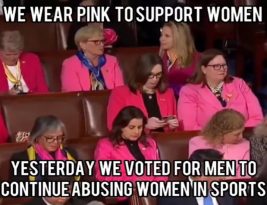Wall Street Opinion Journal Kimberley A. Strassel March 2, 2007 12:01 a.m. EST
For Big Labor, this week’s “card check” victory marked the ultimate payoff for past Democratic election support. For House Democrats, it marked the end of the honeymoon.
Democrats won in November in part by playing down their special interest patrons–unions, environmentalists, trial lawyers–and by playing up a new commitment to the moderate middle class. The big question was whether the party had the nerve to govern the way it campaigned, and card check was the first test. The answer? AFL-CIO chief John Sweeney isn’t smiling for nothing.
Up to now, Speaker Nancy Pelosi had kept her troops in line and her party’s liberal wing in check. The vaunted first “100 hours” was run like a military operation, and revolved around a carefully chosen legislative agenda that would unify every faction in her party. It was small potatoes, but it worked, and it was a lesson in how Democrats can practice smart politics.
The card check, in contrast, is a lesson in how the party’s liberal base forces Democrats to back political losers. The legislation’s only purpose is to give unions an unfair advantage in organizing, namely by eliminating the secret ballot in union elections and instead allowing thugs to openly bully workers into joining up. Americans understand and despise this, with polls showing 90% of the public thinks card check is a racket.
Democrats therefore left themselves wide open for their first public drubbing. The card check gave Republicans a rare opening to beat the daylights out of the new majority, successfully accusing it of trashing democratic elections and shutting down free speech. It unified the business community, which put aside its disagreements on health care and immigration to instead team up to make the vote as painful as possible for Ms. Pelosi’s moderate wing. Even the liberal press jumped ship.
. . . more




Instead of seeking to score cheap points against Democrats, the Wall Street Journal should have used this vote an the opportunity to explore the role of Labor Unions in our more competitive, global economy. There are strong cases to be made both for and against organized labor.
The case for organized labor goes like this:
Why so threatened by a union card?
Europe on the other hand, offers us examples of what can happen when Unions get too strong:
http://economistsview.typepad.com/economistsview/2007/03/market_failure_.html#trackback
I’ve listened to small businessmen complain bitterly about the blackmail they have been subjected to by unions, to pay truly exorbitant hourly rates or go out of business. Also, while the mission of the union should be raise all workers up, often by blocking any and all personnel action directed at non-productive workers, they end up promoting the lowest common denominator instead.
Economist Mark Thoma (whose web site I really like, asks:
http://economistsview.typepad.com/economistsview/2007/03/market_failure_.html#trackback
A Key reason that the Wall Street Journal hates Unions is that they give a political voice to ordinary working people:
Ezra Klein writes:
The Wall Street Journal doesn’t want us ordinary working folks gettin all uppity now.